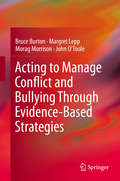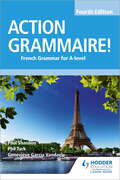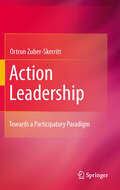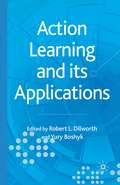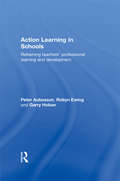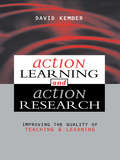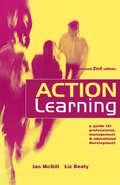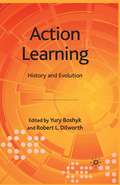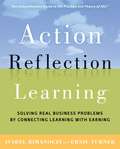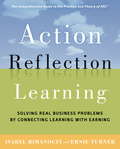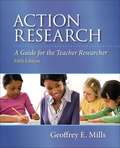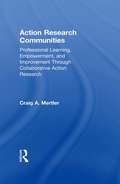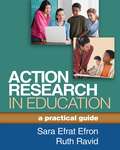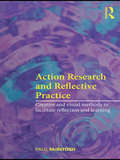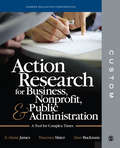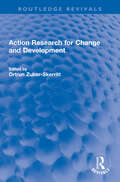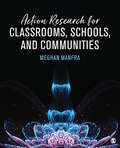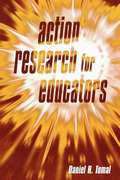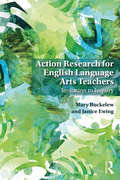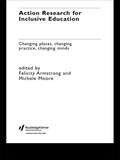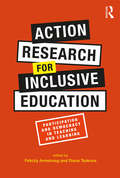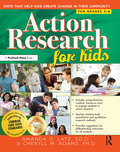- Table View
- List View
Acting to Manage Conflict and Bullying Through Evidence-Based Strategies
by Bruce Burton Margret Lepp Morag Morrison John O'TooleThis book offers a complete and detailed account of the evolution of an internationally successful, evidence-based program that has been the result of almost two decades of action research into conflict and bullying. It addresses one of the most serious problems encountered in schools and work places worldwide: that of bullying and inter-personal conflict. The book presents a comprehensive account of the research, development and refinement of the DRACON Project and the Acting Against Bullying and Cooling Conflicts programs. The effective strategies that emerged from the extensive international research and practice use a combination of theories of conflict and bullying management with drama techniques and peer teaching which have been unique in their application. The book analyses their evolution into an effective program that has impacted positively on bullying and conflict in a number of settings. In the UK the program successfully addressed behavioural problems amongst girls in schools through the use of peer teaching in a drama setting. In Sweden the program assists nursing students, nurses and other health professionals to deal with conflict in the workplace. In Australia it has been applied in hundreds of schools to reduce bullying and assist newly arrived refugees to deal with cultural conflict and develop resilience and self- identity in their new country. This volume makes a major and authentic contribution to the international effort to find effective strategies and techniques to deal with interpersonal conflict and bullying across a range of contexts.
Action Grammaire! Fourth Edition: French Grammar for A Level
by Paul Shannon Phil Turk Geneviève García VandaeleExam board: AQA, Edexcel, OCR, WJEC/EduqasLevel: A-levelSubject: FrenchFirst teaching: September 2016First exams: Summer 2017 (AS) Summer 2018 (A-level)Make French grammar second nature with this trusted reference book containing over 300 activities - now completely revised in line with the new A-level specifications. - Supplement key resources in class or encourage independent practice at home, with clear explanations of the grammar points needed at A-level and knowledge-check exercises throughout - Prepare for assessment with longer application activities focused on developing writing skills such as translation and summary - Build confidence as exercises get increasingly more challenging to mirror students' advancement throughout the course - Check students' progress with regular grammar tests and all answers supplied online
Action Grammaire! Fourth Edition: French Grammar for A Level
by Paul Shannon Phil Turk Geneviève García VandaeleExam board: AQA, Edexcel, OCR, WJEC/EduqasLevel: A-levelSubject: FrenchFirst teaching: September 2016First exams: Summer 2017 (AS) Summer 2018 (A-level)Make French grammar second nature with this trusted reference book containing over 300 activities - now completely revised in line with the new A-level specifications. - Supplement key resources in class or encourage independent practice at home, with clear explanations of the grammar points needed at A-level and knowledge-check exercises throughout - Prepare for assessment with longer application activities focused on developing writing skills such as translation and summary - Build confidence as exercises get increasingly more challenging to mirror students' advancement throughout the course - Check students' progress with regular grammar tests and all answers supplied online
Action Leadership: Towards a Participatory Paradigm (Professional and Practice-based Learning)
by Ortrun Zuber-SkerrittAction leadership is a creative, innovative, collaborative and self-developed way to lead. It eschews the hierarchical structure usually associated with leadership and is based instead on the democratic values of freedom, equality, inclusion and self-realization. It take responsibility for, not control over, people through networking and orchestrating human energy towards a holistic outcome that benefits the common interest. Action leaders are passionate people who abide by the motto that "Learning does not mean to fill a barrel but rather to ignite a flame" in others. And in this time of rapid economic, political, technological, social and ecological changes, action leadership and action leaders are precisely what's needed to improve how people and organizations engage constructively to address the myriad complex issues challenging society at all levels. Action Leadership: Towards a Participatory Paradigm explains and illustrates how action leadership can be developed through participatory action learning and action research (PALAR). It addresses real-life issues by people who choose to work collaboratively towards shared goals while developing their learning, insights, knowledge, people skills and personal relationships through involvement in a PALAR project. The book provides a conceptual framework for action leadership and for the integrative, practical theory of PALAR; and examples of applications in higher education, management education for organization development, and community development. Readers are encouraged to adopt, adapt and further develop the evolving concepts of action leadership and PALAR in a participatory paradigm of learning, research and development.
Action Learning and its Applications
by Yury Boshyk Robert L. DilworthThis second volume of two discusses the employment of action learning in different contexts, including healthcare, education, government, military and the business world. Use of action learning in delivery of Future Search Conferences is addressed, as well as action learning in community and civil society and the future of action learning.
Action Learning in Schools: Reframing teachers' professional learning and development
by Peter Aubusson Robyn Ewing Garry HobanTeaching is becoming increasingly complex in the 21st Century, creating a need for more sophisticated frameworks to support teachers’ professional learning. Action learning is one such framework and has been used for workplace learning in business settings for many years. It is now becoming increasingly popular in school and university settings, but it is often misunderstood. This book clarifies what action learning is, linking key concepts to illustrate that it is not merely a process, but a dynamic interaction between professional learning, communities, leadership and change. The book brings together more than a decade of the authors’ research in school-based action learning. Rich and diverse, the research draws on more than 100 case studies of action learning by teams of teachers in schools. The authors: provide practical advice on how to initiate and sustain action learning; explain the interaction between action learning, teacher development, professional learning, community building, leadership and change; and illustrate how action learning can link to classroom practice so closely that it becomes part of what teachers do, rather than an added impost. Addressing the highs and lows, the successes and failures, and their underlying causes, Action Learning in Schools provides insights into theories of cooperation, innovation, leadership and community formation to inform individual projects and large-scale school improvement initiatives. It will be of interest to teacher educators, pre-service and experienced teachers alike, as well as school and education system managers and policymakers keen to enhance teacher professional learning and educational outcomes for students.
Action Learning, Action Research: Improving the Quality of Teaching and Learning
by David KemberThis volume sets out to provide experience-based tools for those needing to assess and improve teaching and learning quality. It presents a detailed framework explaining what action learning and research is with information on how to carry out an action learning project.
Action Learning: A Practitioner's Guide
by Ian McGill Liz BeatyAction learning is a method of learning that takes place in a group - of colleagues or students. It is widely used in a wide number of educational fields, particularly where learning in groups is appropriate. Action learning is established in both higher education and in professional learning and training situations. First published in 1995, this is a guide to using action learning techniques successfully.;Written by two leading figures in the field, this revised edition retains the same practical guidebook approach to how action learning works. Key points include being a facilitator of action learning, and running workshops for a variety of situations, including higher education, organizational change and professional development.
Action Learning: History and Evolution (The\professional Practices In Adult Education And Lifelong Learning Ser.)
by Yury Boshyk Robert L. DilworthThe first of a two volume set that fully explore the roots of action learning and the legacy of its principal pioneer, Reg Revans. Rather than prescribe one approach to action learning, it shows alternative approaches to fit different contexts, including classic action learning, action reflection learning and business driven action learning.
Action Reflection Learning: Solving Real Business Problems by Connecting Learning with Earning
by Ernie Turner Isabel RimanoczyAction learning has quickly become a tool used by organizations for solving their critical and complex problems. In this revised edition of Optimizing the Power of Action Learning, award winning author Dr. Michael J. Marquardt explores innovative ways that action learning can be applied to the corporate landscape. New material includes: extensive enhancement of the role of the action learning coach; more strategies and steps in introducing, implementing, and sustaining action learning programs inside organizations; many new US and international case studies of action learning, and; additional theoretical elements of action learning. By exploring key principles and best practices that move action learning from good to great, Marquardt highlights resources for transforming people, groups, organizations, and even entire communities. Calling upon his pioneering experiences and the fundamentals introduced in his bestseller Action Learning in Action, Marquardt delivers the next generation of tools and techniques to make action learning successful in any organization. This comprehensive guidebook builds on the real experiences of thousands of managers in hundreds of companies, explores recent innovations in the field, and demonstrates how the power of action learning can help any organization thrive in today's fast-changing global marketplace.
Action Reflection Learning: Solving Real Business Problems by Connecting Learning with Earning
by Isabel Rimanoczy Joseph TurnerLooking for the formula that makes training relevant and transferable — and achieves sustainable results? Look no further than Action Reflection Learning. It’s simple yet essential principles can make an unforgettable impact on your practice and revolutionize the way adult learners learn. Built on a solid foundation of adult learning theory and action learning methodology, this cutting-edge volume delivers a next-generation, multidisciplinary approach that will take your teaching and facilitating interventions to a new level of excellence.
Action Research (Fifth Edition)
by Geoffrey E. MillsThe book provides qualitative and quantitative guidelines for Action Research, to future educators via numerous concrete illustrations, study sites, videos and other supplemental materials.
Action Research Communities: Professional Learning, Empowerment, and Improvement Through Collaborative Action Research
by Craig A. MertlerAction Research Communities presents a new perspective on two current and proven educational practices: classroom-/school-based action research and professional learning communities. Implementation of one or the other of these practices often results in a variety of possible benefits for the teaching–learning process, for student achievement, and for overall school improvement. While these might seem to be separate, isolated practices, the author has taken the beneficial aspects of each practice and merged them into a cohesive and potentially powerful concept, coined "action research communities." Each of the two concepts or approaches (action research and professional learning communities) is presented and discussed in detail. Because they both focus on local-level improvement of educational practice and share several overlapping features, the two concepts are then merged into a single entity—action research communities, or ARCs. These professional learning communities, with action research at their core, hold an immense amount of power and potential when it comes to enhanced professional growth and development for educators, increased student achievement, school improvement, and educator empowerment. ARCs essentially capitalize on all the individualized benefits and strengths of action research and of professional learning communities, and merge them into a single educational concept and practice. ARCs have the potential to help educators everywhere experience:•a common and collective focus and vision;• sustained collaborative inquiry;•individualized, customizable—and meaningful—professional growth; and•true empowerment that comes with this form of collaborative, inquiry-based, and reflective practice.Practical guidance for the development and implementation of ARCs is also provided, by focusing on ways in which professional educators (teachers, administrators, support staff, etc.) can implement, sustain, and extend the impact of their respective action research communities. Specific roles for district administrators, building administrators, and teachers are presented and discussed in depth, as are ways that ARCs can be used both to deepen professional learning for educators and to improve student learning.
Action Research In Education: A Practical Guide
by Sara Efrat Efron Ruth RavidThis text shows educators step by step how to conduct classroom- and school-based studies to improve instructional practices. The book presents methods and strategies for implementing each stage of the action research cycle, providing balanced coverage of qualitative, quantitative, and mixed methods approaches.
Action Research Methods
by Sheri R. KleinIn Action Research Methods , the authors acknowledge that the methodology component is where most of the struggle and confusion lies with students in research methods courses. The overall aim is to assist master's level education students with practical and theoretically grounded approaches to the action research process.
Action Research and Reflective Practice: Creative and Visual Methods to Facilitate Reflection and Learning
by Paul McIntoshThe use of reflection as a tool to support and develop practice is becoming increasingly recognised across education, healthcare and the social sciences. Reflection is assumed to create depth of knowledge and meaning, both for self and those practised upon. Running alongside the use of reflection is the prevalent use of action research which some see as a way of approaching the study of human beings from a philosophical perspective, in which sharing takes place within mutually supportive environments. As a result, many academics and practitioners suggest that one cannot improve the methodology of action research without considering philosophical reflection. In Action Research and Reflective Practice, the author argues that reflective practice and action research can become mechanistic in their use unless fresh creative approaches are employed. Exploring the tension between the use of evidence-based practice, based upon solid ‘objective’ research, and reflection, with its ‘subjectivity’ and personal perception, this book argues that reflection is research. The author increases the use and effectiveness of both action research and reflection through the application of new creative and visual approaches. Action Research and Reflective Practice demonstrates that creative approaches can be utilised effectively in critically reflexive ways, creating a new style of action research that is both innovative and theoretically robust. The resultant approach will improve evidence-based research in education, healthcare and other social sciences to enhance perception and understanding of events, identity and self. This book will be highly beneficial to undergraduate and postgraduate students, as well as educational and social researchers, across a broad range of subjects within the social sciences.
Action Research for Business, Nonprofit, and Public Administration (Custom CEC Edition)
by Emily Alana JamesThis book covers the background, process, and tools needed to introduce and guide students through to a successful action research (AR) project. Included are how to initiate, plan, and complete AR within all types of organizations in business, nonprofit, and public administration. Graphic organizers and a modular sequence of topics help students manage the steps involved in AR practice. A protocol for weekly report writing, informed consent documentation, and clear guidelines for final analyses and report writing give graduate students the efficient format they need. This book teaches theory by interweaving discussion of the major content areas and stories of student success with the concepts that impact practice.
Action Research for Change and Development (Routledge Revivals)
by Ortrun Zuber-SkerrittFirst Published in 1991, Action Research for Change and Development presents a collection of papers evolved from an international symposium on Action Research in Higher Education, Government and Industry held in Brisbane in 1989. The book is structured in three parts. Part one consists of reflections on the meaning and theoretical foundation of action research. Part two discusses various aspects of action research methodology; and Part three presents case studies of action research. The aim of the book is to bring together international experts in action research in higher education in order to present and discuss a variety of models of action research which have been developed in parallel in many parts of the world. This book will be an essential read for scholars and researchers of education, higher education, business, industry, and community development.
Action Research for Classrooms, Schools, and Communities
by Meghan M. ManfraAction Research for Classrooms, Schools, and Communities is a core textbook for the action research course. This book addresses the trend toward high-stakes testing and teacher accountability by focusing on understanding student outcomes. With edTPA rapidly becoming part of the requirements for teacher certification, teacher preparation programs will increasingly be looking to measure the impact of the teacher candidate on student learning. The book focuses on the potential for action research to lead to greater understanding about student outcomes from the perspective of teachers, school leaders, and community members. There is a special emphasis on helping pre-service and experienced teachers use action research to understand their impact on student learning. There is an emphasis on using action research to understand community impacts on schools; unlike other books, this text acknowledges the complex ecology linking classrooms, schools, and the community, especially regarding issues fundamental to school reform.
Action Research for Classrooms, Schools, and Communities
by Meghan M. ManfraAction Research for Classrooms, Schools, and Communities is a core textbook for the action research course. This book addresses the trend toward high-stakes testing and teacher accountability by focusing on understanding student outcomes. With edTPA rapidly becoming part of the requirements for teacher certification, teacher preparation programs will increasingly be looking to measure the impact of the teacher candidate on student learning. The book focuses on the potential for action research to lead to greater understanding about student outcomes from the perspective of teachers, school leaders, and community members. There is a special emphasis on helping pre-service and experienced teachers use action research to understand their impact on student learning. There is an emphasis on using action research to understand community impacts on schools; unlike other books, this text acknowledges the complex ecology linking classrooms, schools, and the community, especially regarding issues fundamental to school reform.
Action Research for Educators
by Daniel R. TomalMost research methods are too impractical and painstaking for educators. Teachers and administrators at all levels—elementary, secondary, and university—need a simple, yet powerful book on conducting action research as a viable method for making educational improvements. This user-friendly book covers the principles and history of action research, ethical and legal considerations, how to conduct both formal and informal action research, data collection methods, data analysis and interpretation, planning and initiating action, and evaluating the results of action. Illustrations are included in each chapter.
Action Research for English Language Arts Teachers: Invitation to Inquiry
by Mary Buckelew Janice EwingOffering preservice and inservice teachers a guide to navigate the rapidly changing landscape of English Language Arts education, this book provides a fresh perspective on what it means to be a teacher researcher in ELA contexts. Inviting teachers to view inquiry and reflection as intrinsic to their identity and mission, Buckelew and Ewing walk readers through the inquiry process from developing an actionable focus, to data collection and analysis to publication and the exploration of ongoing questions. Providing thoughtful and relevant protocols and models for teacher inquiry, this book establishes a theoretical foundation and offers practical, ready-to-use tools and strategies for engaging in the inquiry process in the context of teachers’ communities. Action Research for English Language Arts Teachers: Invitation to Inquiry includes a variety of examples and scenarios of ELA teachers in diverse contexts, ensuring that this volume is relevant and accessible to all educators.
Action Research for Inclusive Education: Changing Places, Changing Practices, Changing Minds
by Felicity Armstrong Michele MooreThis book presents and discusses an approach to action research to help reverse discriminatory and exclusionary practices in education. Insider accounts of action research will help challenge assumptions about the limits of inclusive education, and offer examples of how change can be realistically achieved through processes of collaboration and participation. Written by a team of practitioner researchers drawn from a wide range of schools and services, this book addresses a wide range of real-life situations by exploring ways in which teachers have tackled inequalities in the school environment through action research based on principles of equality and democracy. These include: * the co-ordination of services for minority ethnic groups, including refugee and asylum seeking children* young children with autism working with peers in the literacy hour* action research and the inclusion of gay students* developing the role of learning support assistants in inclusion * reducing exclusion of children with challenging behaviour * listening to the voices of young people with severe learning difficulties * developing links between special and mainstream schools * challenging marginalising practices in Further Education.
Action Research for Inclusive Education: Participation and Democracy in Teaching and Learning
by Felicity Armstrong Diana TsokovaExploring practitioner research and the possibilities it creates for increasing student participation and developing inclusive practices in educational contexts, this insightful text presents a range of original and innovative approaches to Action Research, and highlights the critical relationship between educational theory, research and practice in transformative action. Focussing on social constructivist approaches to teaching and learning, Action Research for Inclusive Education offers first-hand insights from researcher-practitioners from international settings including Denmark, Germany, Ireland, Saudi Arabia, Granada, Greece, Singapore and England. Chapters explore diverse participatory and collaborative research practices which draw on the strengths and contributions of teachers and support staff, pupils, and families to foster inclusive practices across the school community and strengthen the participation and independence of all students. Topics considered include collaboration in Participatory Action Research, friendships and the development of students’ social skills, student voice and the role of pupils as co-researchers and peer mentors. Making an important contribution to debates on inclusive education and the role of practitioners and students in bringing about change, this text will be key reading for students, teachers and educational researchers.
Action Research for Kids: Units That Help Kids Create Change in Their Community (Grades 5-8)
by Cheryll Adams Amanda O. LatzAction Research for Kids provides teachers with comprehensive, creative, and hands-on units to engage students in action research. Students will benefit from learning about quantitative and qualitative research practices that can make a real difference in their lives and those within their communities. Within this text, teachers can select a lesson or use whole units as students explore research methods such as survey research, experimental research, life history, and photovoice in fun lessons that ask them to create a library wish list, interview people in their communities, lobby for cookies in the cafeteria, and experiment with preservatives. Each lesson comes with detailed instructions and ideas for differentiation. Grades 5-8
